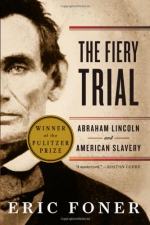
|
| Name: _________________________ | Period: ___________________ |
This test consists of 5 multiple choice questions, 5 short answer questions, and 10 short essay questions.
Multiple Choice Questions
1. In what year did Maryland abolish slavery?
(a) 1865.
(b) 1831.
(c) 1864.
(d) 1795.
2. What candidate was presented by the Constitutional Union Party in the 1860 presidential election?
(a) Zachary Taylor.
(b) John C. Bell.
(c) James Anderson.
(d) John P. Hale.
3. What, also known as the Mason and Slidell Affair, was an international diplomatic incident that occurred during the American Civil War?
(a) The Trent Affair.
(b) The MSA.
(c) The British Affair.
(d) The Mason Affair.
4. Who was an anti-slavery activist who was active in the New York Committee of Vigilance and the Underground Railroad and helped Frederick Douglass escape to freedom?
(a) John P. Hale.
(b) William Lloyd Garrison.
(c) Martin Van Buren.
(d) David Ruggles.
5. What refers to a vocal group of Democrats in the Northern United States who opposed the American Civil War, wanting an immediate peace settlement with the Confederates?
(a) The Copperheads.
(b) The Liberty Party.
(c) War Democrats.
(d) The Free Soil Party.
Short Answer Questions
1. When was the abolitionist newspaper, The Liberator, founded?
2. In 1820, the American Colonization Society began sending black volunteers where to establish a colony for freed American slaves?
3. What nickname did Stephen A. Douglas have in politics?
4. What Pennsylvania governor was a staunch defender of the war effort and Lincoln Administration policies during the Civil War?
5. What refers to the act of withdrawing from an organization, union, or especially a political entity?
Short Essay Questions
1. Why did Lincoln initially refuse to allow blacks in the Union Army, as discussed in Chapter 7?
2. What actions and events led to the beginning of the Civil War, as discussed in Chapter 5?
3. What legislation did Abraham Lincoln introduce to Congress in July of 1862? What became of the legislation?
4. What was Abraham Lincoln's opinion of General Benjamin F. Butler's actions in Chapter 6?
5. What happened to the slaves who escaped to the Union in the beginning of the war, as described in Chapter 6?
6. What military decision did General Benjamin F. Butler make in 1861 regarding escaped slaves?
7. What was permitted by ordinance of the Second Confiscation Act?
8. What did Lincoln say in his inaugural address regarding the South? How was his speech received?
9. What did President Buchanan do in response to the secession of the Southern states in Chapter 5?
10. What actions did Secretary of State Seward take to further the colonialist cause during the Civil War? What problems were encountered?
|
This section contains 907 words (approx. 4 pages at 300 words per page) |

|




